In the world of JavaScript development, managing repetitive tasks can be a time-consuming and error-prone process. Fortunately, task runners offer a solution by automating these tasks, enabling developers to focus on more important aspects of their work. Task runners are tools that streamline processes such as code compilation, testing, bundling, and deployment. In this article, we will explore the benefits of using task runners in JavaScript development and discuss best task runners available for JavaScript developers.
Task runners play a vital role in streamlining development workflows by automating repetitive tasks. For instance, during the development process, it’s common to have multiple JavaScript files that need to be concatenated and minified to reduce the overall size of the code. Manually performing these tasks can be time-consuming and prone to human error. Task runners like Grunt, Gulp, and npm scripts offer simple and efficient solutions for automating such tasks.
So, without further ado, let’s check some of the best task runners for Javascript available for your projects.
1. Grunt
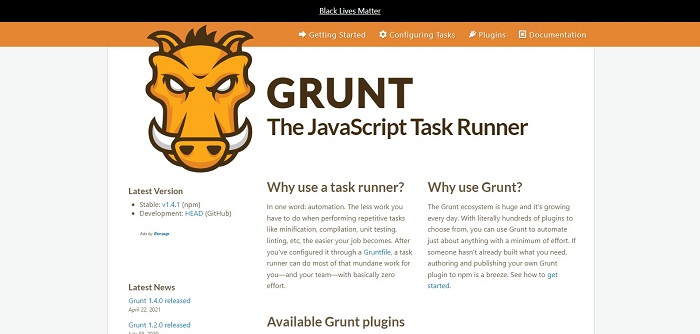
Grunt is one of the most popular task runners in the JavaScript ecosystem. It boasts a vast ecosystem of plugins, allowing developers to automate various tasks such as code concatenation, minification, and testing. Grunt’s configuration-based approach, defined in a Gruntfile.js, provides flexibility and granular control over workflows. With Grunt, you can effortlessly define complex tasks, manage dependencies, and share configurations across projects. While Grunt has been around for some time, it remains a reliable choice due to its stability, maturity, and extensive plugin support.
2. Gulp
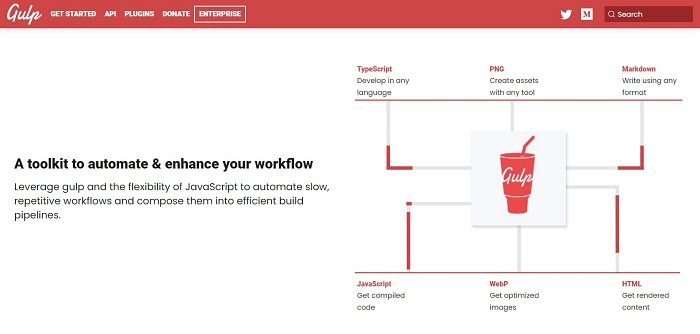
Gulp follows a different approach compared to Grunt. It leverages the power of streams to create efficient and intuitive task workflows. Gulp’s code-driven configuration, defined in a gulpfile.js, allows developers to write simple and readable tasks. The streaming nature of Gulp tasks improves performance by avoiding unnecessary file writes. Gulp’s plugin ecosystem is vast and actively maintained, enabling developers to handle diverse tasks effortlessly. With Gulp, you can perform tasks such as file concatenation, CSS preprocessing, transpilation, and much more with ease.
3. Yarn

Yarn caches every package it downloads so it never needs to download it again. It also parallelizes operations to maximize resource utilization so install times are faster than ever. Yarn uses checksums to verify the integrity of every installed package before its code is executed. The same dependencies will be installed the same exact way across every machine regardless of install order. Yarn efficiently queues up requests and avoids request waterfalls in order to maximize network utilization.
4. Requirejs
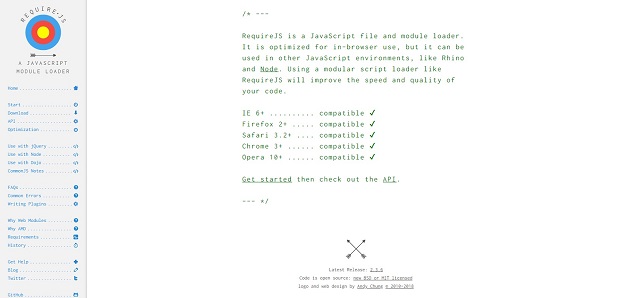
RequireJS is a JavaScript file and module loader. It is optimized for in-browser use, but it can be used in other JavaScript environments, like Rhino and Node. Using a modular script loader like RequireJS will improve the speed and quality of your code.
RequireJS uses plain script tags to load modules/files, so it should allow for easy debugging. It can be used simply to load existing JavaScript files, so you can add it to your existing project without having to re-write your JavaScript files.
RequireJS includes an optimization tool you can run as part of your packaging steps for deploying your code. The optimization tool can combine and minify your JavaScript files to allow for better performance.
If the JavaScript file defines a JavaScript module via define(), then there are other benefits RequireJS can offer: improvements over traditional CommonJS modules and loading multiple versions of a module in a page. RequireJS also has a plugin system that supports features like i18n string bundles, and text file dependencies.
5. Brunch

Brunch is a modern and lightweight task manager and build tool designed for front-end web development. It focuses on simplicity, speed, and ease of use. Brunch automates various development tasks such as compiling and optimizing code, bundling assets, and managing dependencies.
Brunch uses a convention-over-configuration approach, minimizing the need for manual configuration. It employs a file-based configuration system, where project-specific settings are defined in a brunch-config.js file. This file specifies input and output paths, asset compilation rules, and plugin configurations.
One of Brunch’s key features is its fast build process. It utilizes a dependency graph to efficiently track changes and rebuild only the necessary parts of the project. This can significantly reduce development time, especially in larger projects with numerous assets and dependencies.
6. npm Scripts
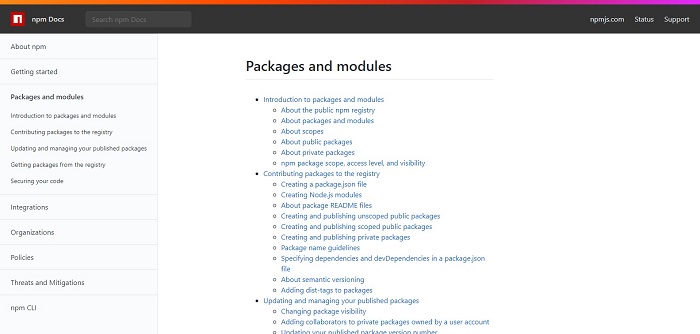
npm, the package manager for JavaScript, also serves as a capable task runner. By utilizing the scripts section in the package.json file, developers can define and execute custom tasks. npm scripts are lightweight, require no additional dependencies, and integrate seamlessly with other npm-based workflows. While not as feature-rich as Grunt or Gulp, npm scripts are often preferred for small to medium-sized projects where simplicity and minimal setup are desired. npm scripts can be combined with other tools and libraries to create robust build processes, automate testing, and perform other essential tasks.
7. Webpack
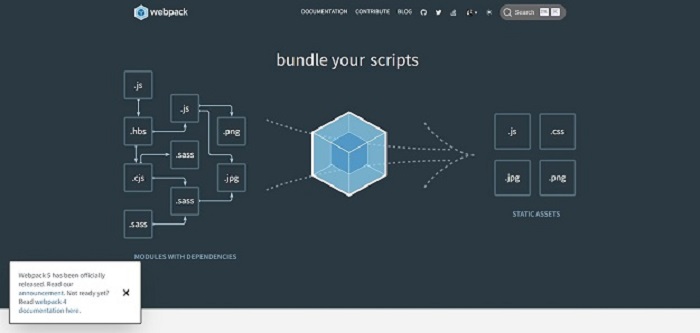
Although primarily known as a module bundler, Webpack has evolved to handle various task running capabilities. It offers a wide range of plugins and loaders that enable developers to automate tasks like code splitting, asset optimization, and hot module replacement. webpack’s configuration-based approach allows for highly customized workflows, with the ability to create multiple entry points, handle different environments, and optimize bundles for performance. With its extensive ecosystem and continuous development, webpack has become a popular choice for complex JavaScript projects that require powerful bundling and task automation.
8. Parcel
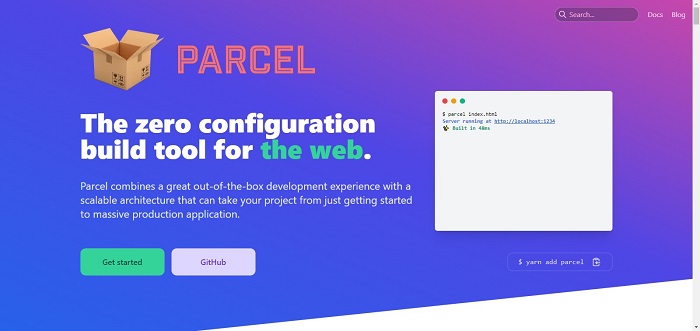
Parcel is a zero configuration build tool for the web. It combines a great out-of-the-box development experience with a scalable architecture that can take your project from just getting started to massive production application. Parcel optimizes your whole app for production automatically. This includes tree-shaking and minifying your JavaScript, CSS, and HTML, resizing and optimizing images, content hashing, automatic code splitting, and much more. Parcel automatically transforms your code for your target environments. From modern and legacy browser support, to zero config JSX and TypeScript compilation, Parcel makes it easy to build for any target – or many!
9. Rollup

Rollup is a module bundler for JavaScript which compiles small pieces of code into something larger and more complex, such as a library or application. It uses the standardized ES module format for code, instead of previous idiosyncratic solutions such as CommonJS and AMD. ES modules let you freely and seamlessly combine the most useful individual functions from your favorite libraries. Rollup can optimize ES modules for faster native loading in modern browsers, or output a legacy module format allowing ES module workflows today.
Conclusion
Task runners have revolutionized JavaScript development by automating repetitive tasks and streamlining workflows. They enhance productivity, reduce manual errors, and enable developers to focus on more critical aspects of their work. Using task runners in development process, JavaScript developers can boost efficiency, maintain code quality, and deliver applications faster than ever before.




